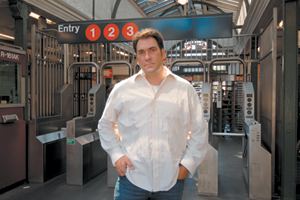Peer Review ::
Bar review
Former public defender David Feige hopes his TV pilot makes the grade
According to veteran public defender David Feige, AB’88, there are plenty of problems with America’s criminal-justice system: racial inequality, excessive criminalization, and Law & Order. In almost every episode, he says, “there’s a fat, schlubby public defender sitting there with his tie askew, looking like a greaseball, while the handsome, chiseled-jaw prosecutor paces back and forth in front of the client.” The defense lawyer “sits there like a moron” while the accused starts speaking directly to the prosecutor. Such scenes, says Feige, a professor at Seton Hall University School of Law with 15 years’ defense experience representing clients in Harlem and the South Bronx, are not only unrealistic, “they’re downright corrosive.”

Ticket to ride: David Feige turned his legal experience into a TV script.
Feige (pronounced “FI-guh”) wants to set the record straight. This November he may get his chance. By the end of the month TNT will decide whether to pick up Raising the Bar, a TV pilot he recently cowrote and shot in August with Emmy-winning producer Steven Bochco, cocreator of Hill Street Blues, LA Law, and NYPD Blue. The legal drama focuses on a young Bronx public defender—based on Feige and played by Mark-Paul Gosselaar (Commander in Chief)—whose law-school buddies work for the opposing side. Other cast members include Emmy-nominated actresses Jane Kaczmarek, who plays an overbearing judge, and Gloria Reuben as head of the public defender’s office.
Asked how the project came about, Feige seems incredulous. “It’s the weirdest, most fairy tale-ish story,” he says. Though he had long written about the criminal-justice system for the New York Times, Slate, the Washington Post, and the Los Angeles Times, and had done legal commentary for NPR and Court TV, he was never “the public defender hiding a screenplay in the drawer.” Since graduating from the University of Wisconsin Law School in 1991, he’d been defending clients charged with misdemeanors, drug possession, homicides, and other felonies in Manhattan, Brooklyn, and the Bronx. Yet when his 2006 autobiography Indefensible: One Lawyer’s Journey into the Inferno of American Justice (Little, Brown & Co.), hit shelves and attracted interest from Hollywood, Feige saw an opportunity to redefine “the classic Law & Order trope.”
He mailed a copy of the book to Bochco, whom he calls “the only person who’s ever done a complicated, sophisticated portrayal of a public defender,” (i.e., Joyce Davenport on Hill Street Blues). A few weeks later, Bochco called Feige at his home in New York. “So I’m sitting there in my 380-square-foot studio apartment, in my bathrobe, talking to this guy I really respect, and he likes the book,” says Feige. Unfortunately, Bochco didn’t see the book as a show. But he gave Feige his home number and told him to keep working on the idea.
After a week of e-mail exchanges, they’d hashed out a concept. Within the next two months, Bochco sold the idea to TNT and flew Feige out to Los Angeles, where they spent a week brainstorming characters and story. “So I went home [to New York],” recalls the first-time script writer, “totally, crazily high from this experience, and banged out a script in a week that was the most awful thing ever—and made the mistake of sending it to Steven.” Bochco urged him to slow down and start fresh. Several drafts later, they turned in the script to the network and got the green light to shoot a pilot.
“It was exactly the deal that everybody in Hollywood said wouldn’t happen,” says Feige, who turned down an offer from another studio that wanted to purchase the book rights to Indefensible but was hesitant to enlist an untested screenwriter like Feige as part of the day-to-day creative team. Given the poor portrayal of public defenders in the media, however, he’d decided he didn’t want to sit on the sidelines.
Nor did he want his clients cast as one-sided bad guys. “I can’t have, in episode three, some female public defender representing some bad black kid in a red do-rag who’s flashing gang signs in court and threatening her. That never happens,” Feige recalls telling Bochco. “Putting a human face on people charged with a crime is very, very difficult to do these days but utterly critical to understanding why we do what we do as public defenders,” he says. Most shows, Feige explains, ignore the close, sympathetic relationship between defense lawyers and their clients. If Raising the Bar gets the go-ahead from TNT, he hopes it will humanize the individuals he has spent his career protecting. As for adapting them for television, he credits Bochco entirely. “He could probably teach a parrot to whistle Mozart, and I’m just the luckiest parrot in the jungle.”